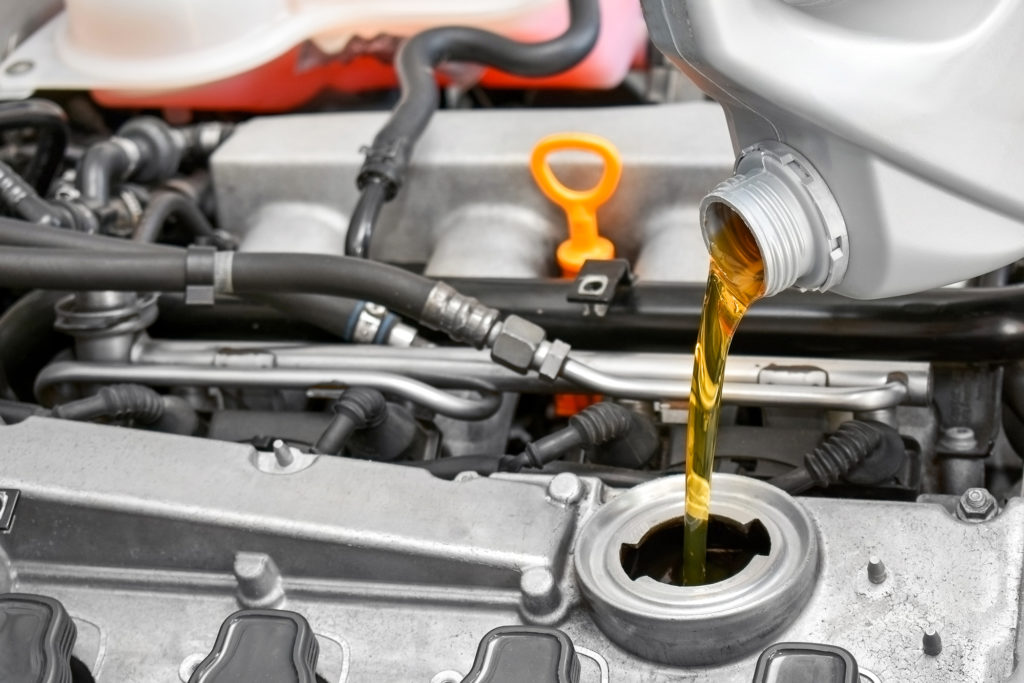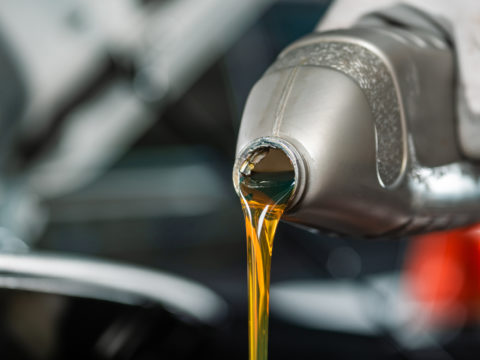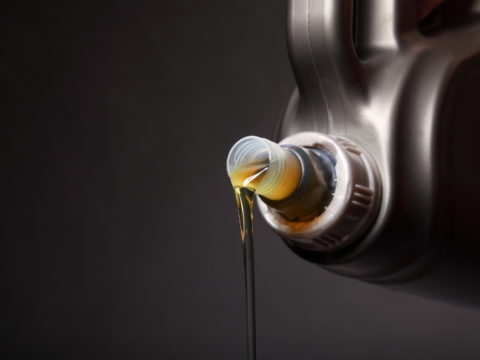When choosing the right oil for your car, the number of options can be a little overwhelming. They are labeled by a series of letters and numbers which all mean different things. With all of the different types of oil, how do you know which one to put in your car? If you’re considering buying 0W-20 synthetic motor oil, here’s all the information you need to know!

Contents
0W-20 Oil Overview
0W-20 synthetic oil is a low viscosity, fully synthetic motor oil that works well in many cars. It works especially well in colder weather. If you want a safer oil with less gunk and buildup in the winter, you might want 0W-20 oil in your car. However, it doesn’t work well in higher temperatures or two-wheelers.
What Do the Numbers and Letters in 0W-20 Oil Mean?
The numbers and letters in the names of the oils have meaning behind them. They are a method of identifying the type of oil, the viscosity, and when the oil is primarily used. The final two numbers indicate how well the oil performs at higher temperatures.
For example, the first 0 in 0W-20 is for the viscosity of the oil. It’s a very thin oil, primarily used in winter (this is where the W comes in). The lower the number before the W, the better it performs in colder weather.
The last two numbers reference how smoothly the oil will run through the engine at higher temperatures. A lower number means that the oil runs more quickly and smoothly through the engine, so the 20 is a good number.
Who Makes 0W-20 Oil?
Many brands manufacture 0W-20 oil. As it grows in popularity, more large companies request it. The largest oil creators in the world have started to make 0W-20 oil, and continue to do so. Here are just a few of the oil companies who make it:
- Pennzoil
- Mobil
- Amsoil
- Castrol
- Liqui Moly
- Idemitsu
- Royal Purple
- Valvoline
Each of these companies makes a slightly different synthetic blend, but all of them follow the same guidelines: a winter oil (W) with no viscosity in cold temperature (0) and a small amount in hot weather (20). They all fulfill the requirements and make oil that works well in winter and most vehicles.
Where to Buy 0W-20 Oil
You can buy 0W-20 at most major convenience stores like Walmart, Home Depot, or Autozone. If you prefer to pay a mechanic to change your oil, you can always request 0W-20 oil at your local auto shop. However, you must ask a licensed mechanic for advice before changing the type of oil in your car.
What Type of Oil is 0W-20?
0W-20 is partly or fully synthetic oil. It is based heavily on synthetic oil because natural oil will not hold up with such low viscosity. The natural oil needs to be thicker to stick together, but 0W-20 was made to be better in lower temperatures. You won’t find all natural 0W-20 oil, but partly synthetic and fully synthetic 0W-20s work very well.
What is 0W-20 Oil Used For?
0W-20 was first produced for usage in winter to make it easier to start cars and keep the engine running. However, it’s since become more popular with all kinds of cars and weather because of its low viscosity and smoothness. As newer engines and hybrids become more popular, low viscosity oils are recommended more often.
Notable Features of the 0W-20 Oil
The most notable feature of 0W-20 oil is the extremely low viscosity. However, several other parts should be mentioned, including the composition, operating temperature, and price. Here are the basics of 0W-20 and how it performs in a regular car.
Overall Performance
The overall performance of the 0W-20 oil is robust. It has become a popular engine oil for high-performance levels in cold weather and decent performance in hot temperatures. The only downsides of the 0W-20 oil are its price and that it’s not great for higher-temperature vehicles.
This oil does especially well for regular sedans, SUVs, and small cars with normal driving habits. However, it doesn’t do well in high-powered, smaller vehicles such as motorcycles. This flaw is because the temperature range is lower, and high-powered vehicles tend to run hotter.
Composition
The partially or all-synthetic motor oil has a chemical composition of oil and various additives. Most brands use fully synthetic oil, created in a lab for high performance and extra engine life throughout the winter.
Viscosity
Of course, the highlight of 0W-20 oil is how thin it is. Lower viscosity is what makes the grease run smoothly through the engine, start well in lower temperatures, and prevent gunk and buildup throughout the engine. The thickness of oil is reflected in its labeling: 0W-20 has 0 viscosity in cold temperatures and 20 viscosity in higher temperatures.
Operating Temperature
The operating temperature of 0W-20 is much larger than most other synthetic oils. 0W-20 oils protect a car engine at a high temperature of around 400℉. While this isn’t as high as some of the higher viscosity oil, it runs smoother through the engine. However, the oil shines in low temperatures–it can still pour at -50℉.
Mileage
0W-20 engine oil can increase the mileage in your car in two ways: the time between your oil changes and the overall engine performance. With a high-level engine oil, you might be able to drive up to 10,000 miles between each oil change. The smooth and slick oil will help your engine run smoother and increase your regular mileage as well.
Price Per Quart
One of the downsides of 0W-20 oil is its price. This oil generally sells for about $6.26 a quart. Oil changes can run anywhere from $40 to $75, depending on the mechanic and type of car. The price reflects the combination of chemicals and additives in the motor oil that makes it smooth.

Advantages and Disadvantages of Using 0W-20 Oil
As with any oil, there are both advantages and disadvantages to using 0W-20 in your car. It works well for the correct engine but can cause damage in the wrong one. Here are some of the pros and cons of 0W-20 oil.
Pros
The 0W-20 oil is an excellent choice for almost any regular car. It is versatile, working well both in cold and hot conditions. Here are some of the main advantages of 0W-20 oil:
- Smooth performance in cold weather
- Increases engine life and health
- Higher fuel economy
- Oil changes last longer
- Oil doesn’t build up or turn to sludge
- Runs quickly and smoothly through the engine
Cons
If you live in higher temperature climates or run your vehicle at high temperatures, 0W-20 might not be the best. Here are some of the cons of using 0W-20 oil:
- Low viscosity burns easily at high temperatures
- Not a natural oil–synthetically made
- More expensive than thicker oils
Who Makes the Best 0W-20 Synthetic Oil?
Because 0W-20 is an increasingly popular synthetic oil, several famous oil brands create, market, and sell it. For the best 0W-20 synthetic oil choose one of these five brands, and you will be good to go. Whether you go to a mechanic or change oil yourself, check the brand to ensure it’s solid.
Pennzoil
Of course, the biggest household name in oil is probably Pennzoil. Like many of their other oils, the 0W-20 is of good quality and comes at a fair price. It’s more expensive than more viscous oils but not as expensive as the other brands that sell 0W-20.
Mobil
Mobil is one of the oldest oil manufacturers in the United States and one of the first to offer 0W-20 motor oils at every level. Their oils are fully synthetic. If you buy the gold level, you can drive up to 10,000 miles before going back to the mechanic.
Valvoline
One of the largest motor oil chains in the world, Valvoline is incredibly easy to set up an account and get your oil changed wherever you are. Their worldwide computer systems stay up to date with your address and car information, and they offer high-quality motor oil for multiple different kinds of vehicles.
Castrol
Castrol is yet another oil company that makes a high-quality version of the 0W-20 engine oil. With Castrol’s engine oil, you’ll be able to go over 8,000 miles without getting your oil changed. It also can up the gas mileage on certain cars, depending on driving conditions and temperatures.
Royal Purple
Although it’s not as much of a household name as some other brands on this list, Royal Purple has a history of making and selling high-quality motor oils. Their 0W-20 is of excellent quality and will last a long time in your vehicle. However, it’s not sold in many places.
Final Thoughts
0W-20 is a versatile, low viscosity synthetic oil blend that works well in any car. It is especially beneficial in winter when car engines can struggle to turn on and the oil can be sluggish. With 0W-20, you can rest assured that your car will work well, and the engine oil won’t build up.














